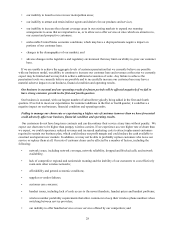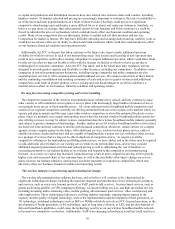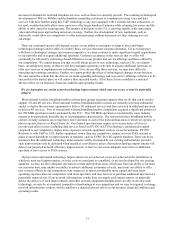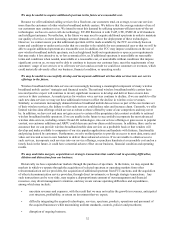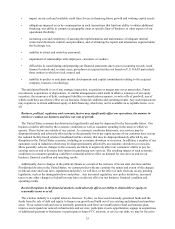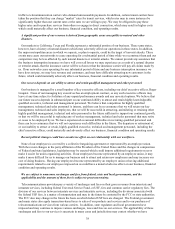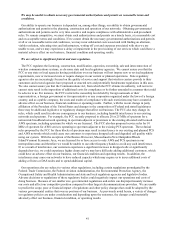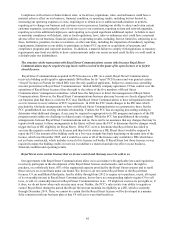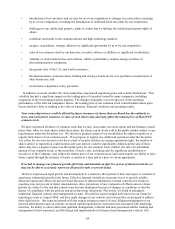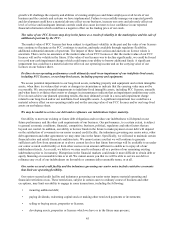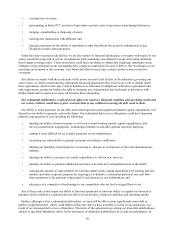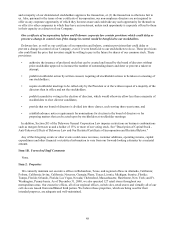Metro PCS 2008 Annual Report Download - page 47
Download and view the complete annual report
Please find page 47 of the 2008 Metro PCS annual report below. You can navigate through the pages in the report by either clicking on the pages listed below, or by using the keyword search tool below to find specific information within the annual report.38
traffic to telecommunication carriers who demand unreasonable payments. In addition, certain transit carriers have
taken the position that they can charge “market” rates for transit services, which rates may in some instances be
significantly higher than our current rates or the rates we are willing to pay. We may be obligated to pay these
higher rates and/or purchase services from others or engage in direct connection, which may result in higher costs
which could materially affect our business, financial condition, and operating results.
A significant portion of our revenue is derived from geographic areas susceptible to natural and other
disasters.
Our markets in California, Texas and Florida represent a substantial portion of our business. These same states,
however, have a history of natural disasters which may adversely affect our operations in those states. In addition,
the major metropolitan areas in which we operate, or plan to operate, could be the target of terrorist attacks. These
events may cause our networks to cease operating for a substantial period of time while we reconstruct them and our
competitors may be less affected by such natural disasters or terrorist attacks. We cannot provide any assurance that
the business interruption insurance we have will cover all losses we may experience as a result of a natural disaster
or terrorist attack, that the insurance carrier will be solvent or that the insurance carrier will pay all claims made by
us. If our networks cease operating for any substantial period of time and any business interruption insurance we
have does not pay, we may lose revenue and customers, and may have difficulty attracting new customers in the
future, which could materially adversely affect our business, financial condition and operating results.
Our success depends on our ability to attract and retain qualified management and other personnel.
Our business is managed by a small number of key executive officers, including our chief executive officer, Roger
Linquist. None of our managing key executives has an employment contract, so any such executive officers may
leave at any time subject to forfeiture of any unpaid performance awards and any unvested options. We believe that
our future success depends in substantial part on our continued ability to attract and retain highly knowledgeable,
qualified executive, technical and management personnel. We believe that competition for highly qualified
management, technical and sales personnel is intense, and there can be no assurance that we will retain our key
management, technical and sales employees, that we will be successful in attracting, assimilating or retaining other
highly qualified management, technical and sales personnel in the future sufficient to support our continued growth,
or that we will be successful in replacing any of our key management, technical and sales personnel that may retire
or cease to be employed by us. We have experienced occasional difficulties in recruiting qualified personnel and
there can be no assurance that we will not experience such difficulties in the future. The departure or retirement of,
or our inability to attract or retain, highly qualified executive, technical and management personnel, including the
chief executive officer, could materially and adversely affect our business, financial condition and operating results.
Recent political changes could have an adverse effect on our relationship with our workforce.
None of our employees is covered by a collective bargaining agreement or represented by an employee union.
With the recent changes in the party affiliation of the President of the United States and the changes in composition
of Federal and state legislatures, legislation may be enacted which could impose additional requirements on us or
make it easier for union organizing activities. If our employees become represented by an employee union, it may
make it more difficult for us to manage our business and to attract and retain new employees and may increase our
cost of doing business. Having our employees become represented by an employee union or having additional
requirements related to our employees imposed on us could have a material adverse effect on our business, financial
condition and operating results.
We are subject to numerous surcharges and fees from federal, state and local governments, and the
applicability and the amount of these fees is subject to great uncertainty.
Telecommunications providers pay a variety of surcharges and fees on their gross revenues from interstate and
intrastate services, including federal Universal Service Fund, or USF, fees and common carrier regulatory fees. The
division of our services between interstate services and intrastate services, including the divisions associated with
the federal USF fees, is a matter of interpretation and may in the future be contested by the FCC or state authorities.
The FCC also may change in the future the basis on which federal USF fees are charged. The Federal government
and many states also apply transaction-based taxes to sales of our products and services and to our purchases of
telecommunications services from various carriers. In addition, state regulators and local governments have
imposed and may continue to impose various surcharges, taxes and fees on our services. The applicability of these
surcharges and fees to our services is uncertain in many cases and jurisdictions may contest whether we have


